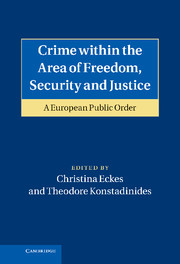Book contents
- Frontmatter
- Contents
- Contributors
- Acknowledgements
- ABBREVIATIONS
- Introduction
- 1 EU criminal justice: beyond Lisbon
- 2 The European Union policy against corruption in the light of international developments
- 3 The EU's anti-money laundering agenda: Built on risks?
- 4 EU anti-money laundering regulation: Multilevel cooperation of public and private actors
- 5 The legal framework of the European Union's counter-terrorist policies: full of good intentions?
- 6 Organised crime: developments and challenges for an enlarged European Union
- 7 The Europeanisation of extradition: how many light years away to mutual confidence?
- 8 The European Evidence Warrant: Mutual Recognition and Mutual (Dis)Trust?
- 9 Law and order and internal security provisions in the Area of Freedom, Security and Justice: before and after Lisbon
- 10 The external dimension of the EU's Area of Freedom, Security and Justice
- Index
- References
6 - Organised crime: developments and challenges for an enlarged European Union
Published online by Cambridge University Press: 01 June 2011
- Frontmatter
- Contents
- Contributors
- Acknowledgements
- ABBREVIATIONS
- Introduction
- 1 EU criminal justice: beyond Lisbon
- 2 The European Union policy against corruption in the light of international developments
- 3 The EU's anti-money laundering agenda: Built on risks?
- 4 EU anti-money laundering regulation: Multilevel cooperation of public and private actors
- 5 The legal framework of the European Union's counter-terrorist policies: full of good intentions?
- 6 Organised crime: developments and challenges for an enlarged European Union
- 7 The Europeanisation of extradition: how many light years away to mutual confidence?
- 8 The European Evidence Warrant: Mutual Recognition and Mutual (Dis)Trust?
- 9 Law and order and internal security provisions in the Area of Freedom, Security and Justice: before and after Lisbon
- 10 The external dimension of the EU's Area of Freedom, Security and Justice
- Index
- References
Summary
INTRODUCTION
Organised crime is a complex phenomenon. Historically, there has probably always been some form of structured or semi-structured criminal activity at all levels. Just as its shape and features vary, depending on the context in which it develops, so do the methods and the legislative criteria that are employed to combat it, although they have a number of elements in common. What makes European and international policies against organised crime particularly relevant nowadays is the dimension of this phenomenon and its increased ability to affect the economy and the society of one or more states at a time.
The strengthening of EU institutions and the trend towards more integration have brought about growing political pressure to forge common strategies for prevention and repression, as part of the broader canvas of judicial and police cooperation in criminal matters. These strategies, which have been influenced by criminological theories initially elaborated in the US, have been developing in a non-organic fashion, resulting in an incoherent and fragmented cooperation structure. The reasons for this are manifold, from the non-uniform evolution of the EU as a whole to the controversial mechanisms of decision-making within the pre-Lisbon third pillar. One cannot overlook the existence of different legal definitions of ‘criminal organisation’ in the various Member States and the difficulties deriving from this.
- Type
- Chapter
- Information
- Crime within the Area of Freedom, Security and JusticeA European Public Order, pp. 159 - 191Publisher: Cambridge University PressPrint publication year: 2011
References
- 2
- Cited by



